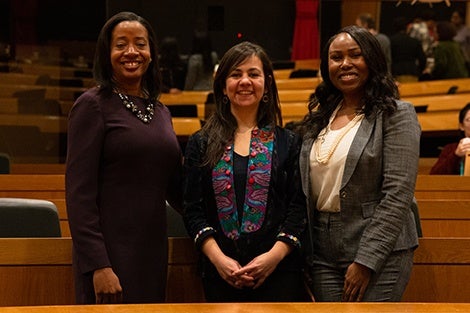March 12, 2019 – The health of particular groups of people—including caregivers for children, patient care workers, and people exposed to chemicals at work—was the focus of the Yerby Postdoctoral Fellows who spoke at a recent symposium at Harvard T.H. Chan School of Public Health.
After an introduction from Dean Michelle Williams, the three Yerby Fellows—Tia McGill Rogers, Maria Andree Lopez Gomez, and Aisha Dickerson—gave presentations about their research at the Second Annual Yerby Postdoctoral Fellowships Program Symposium, held on March 4, 2019 in Kresge G3.
Watch a webcast of the symposium
Named for Dr. Alonzo Smyth Yerby, an African American pioneer in public health, Harvard Chan School’s Yerby Program is geared toward expanding diversity in academic public health. The program, which has trained more than 50 postdoctoral Fellows since its inception in 2001, creates a bridge between academic training in health-related fields and entry-level faculty positions at U.S. higher education institutions. The program is overseen by Betty Johnson, assistant dean for faculty and staff diversity, development and leadership.
The Yerby Fellows each described their work—its purpose, methods, and results—and took audience questions.
Rogers studies the effectiveness of methods to prevent the maltreatment of children. She noted that parenting intervention programs focused on expanding child-rearing skills are often used to address child maltreatment. In her research, Rogers has examined how a caregivers’ mental health can influence how they use and benefit from such programs. One of her findings was that child neglect is much more likely among caregivers who are depressed, compared with those who are not. But she also found that, among caregivers who were receiving mental health support at the same time that they were enrolled in a parenting program, there was actually an increase in psychologically aggressive incidents toward the children they were caring for. The finding suggests that offering too many supportive services concurrently may overload some caregivers, and that it might be best to stagger services, Rogers said.
Gomez discussed her research on the working conditions and health and safety of patient care workers. Using data from a group of Boston-area patient care workers (mostly nurses), Gomez found that when they experienced greater levels of certain working conditions—such as co-worker support and a people-oriented culture —they used fewer mental health services, resulting in employer cost savings. She said her findings “make the business case that protecting and promoting the mental health of workers is also important for the employer.”
Dickerson described her work looking at the links between exposure to certain chemicals on the job and the risk of ALS (amytrophic lateral sclerosis), also known as Lou Gehrig’s disease. Using population datasets from Denmark, Dickerson looked at exposures to chemicals in diesel exhaust, adhesives, paint, paint strippers, and gasoline. She found that the more of these chemicals people are exposed to, and the longer the exposure, the greater their risk for ALS. Men typically face the highest risk, she added, because they work more often as truck drivers, construction workers, machine operators, or in the military, where chemical exposures are high.
photo: Sarah Sholes
